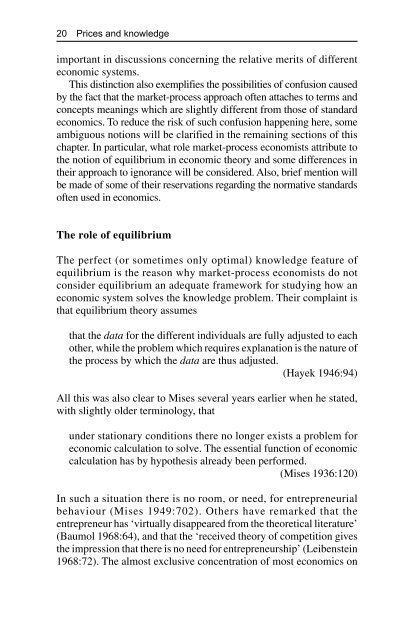Prices and knowledge: A market-process perspective
Prices and knowledge: A market-process perspective
Prices and knowledge: A market-process perspective
You also want an ePaper? Increase the reach of your titles
YUMPU automatically turns print PDFs into web optimized ePapers that Google loves.
20 <strong>Prices</strong> <strong>and</strong> <strong>knowledge</strong>important in discussions concerning the relative merits of differenteconomic systems.This distinction also exemplifies the possibilities of confusion causedby the fact that the <strong>market</strong>-<strong>process</strong> approach often attaches to terms <strong>and</strong>concepts meanings which are slightly different from those of st<strong>and</strong>ardeconomics. To reduce the risk of such confusion happening here, someambiguous notions will be clarified in the remaining sections of thischapter. In particular, what role <strong>market</strong>-<strong>process</strong> economists attribute tothe notion of equilibrium in economic theory <strong>and</strong> some differences intheir approach to ignorance will be considered. Also, brief mention willbe made of some of their reservations regarding the normative st<strong>and</strong>ardsoften used in economics.The role of equilibriumThe perfect (or sometimes only optimal) <strong>knowledge</strong> feature ofequilibrium is the reason why <strong>market</strong>-<strong>process</strong> economists do notconsider equilibrium an adequate framework for studying how aneconomic system solves the <strong>knowledge</strong> problem. Their complaint isthat equilibrium theory assumesthat the data for the different individuals are fully adjusted to eachother, while the problem which requires explanation is the nature ofthe <strong>process</strong> by which the data are thus adjusted.(Hayek 1946:94)All this was also clear to Mises several years earlier when he stated,with slightly older terminology, thatunder stationary conditions there no longer exists a problem foreconomic calculation to solve. The essential function of economiccalculation has by hypothesis already been performed.(Mises 1936:120)In such a situation there is no room, or need, for entrepreneurialbehaviour (Mises 1949:702). Others have remarked that theentrepreneur has ‘virtually disappeared from the theoretical literature’(Baumol 1968:64), <strong>and</strong> that the ‘received theory of competition givesthe impression that there is no need for entrepreneurship’ (Leibenstein1968:72). The almost exclusive concentration of most economics on
















